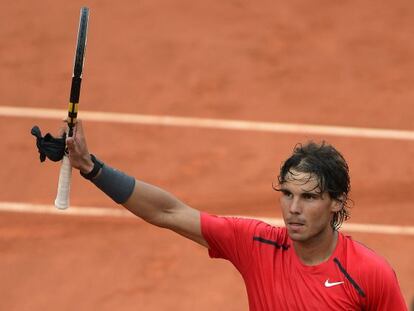Nadal’s reasons to believe in seventh heaven
Top Spaniards advance without blemish on records as rivals feel heat of battle

Rafael Nadal strolled into the fourth round at Roland Garros on Saturday, ambling past world number 192 Eduardo Schwank 6-1 6-3 6-4, en route to a match-up with 13th seed Juan Mónaco. The world number two, who has dropped just 17 games in three rounds, was the pre-tournament favorite by about half a country mile but events over the weekend on the Parisian clay will only have served to reinforce the Spaniard’s belief that he will lift a record seventh title next Sunday.
However, his uncle and coach, Toni Nadal, in a readers’ interview with EL PAÍS, identified his nephew’s oft-tinkered delivery as a potential target for his rivals: “Service is one of Rafael’s weaknesses. We’ve been trying to improve it for years. It’s taken us a lot of work to do so. Consistency on serve is the thing Rafael finds most difficult. It has to be said: Djokovic, Federer and Murray serve considerably better.”
That could prove to be a lifeline for Mónaco, who survived the onslaught of Milos Raonic to set up his date with the reigning champion. The Canadian hammered down 26 aces in their third-round match, and sprayed 73 winners about for good measure, but the Argentinean held fast, took advantage of three of his 16 break point opportunities and eventually took the match in five, with a little help from Raonic’s 88 unforced errors.
But that sort of abandon will be required to defeat Nadal, whose consistency in long rallies often carries him over the line. “He is not a virtuoso as Federer can be, but he is more or less technically complete,” said Toni Nadal. “His best quality is his mental ability to confront difficult situations.”
He is not a virtuoso as Federer can be, but he is more or less technically complete"
“He’s one of the players I really like on the tour,” the second seed said of Mónaco. “I really get on well with him. We know each other very well, personally speaking, but also from the tennis point of view. We spend a lot of hours together — we practice very often together so we both know what we’re going to try and do.”
On Sunday, the top half of the men’s draw was on display and both Djokovic and Federer were given scares, of differing degrees, in negotiating their fourth-round matches. The world number one dropped the first two sets against 22nd seed Andreas Seppi before recovering to eke out a 4-6, 6-7, 6-3, 6-3, 7-5 victory. Djokovic hit an uncharacteristic 77 unforced errors and will next play either Jo-Wilfried Tsonga, who has the armory to exploit the slightest chink in the Serb’s armor, or hard-hitting Swiss Stanislas Wawrinka.
Federer had less trouble in his match against world 109 David Goffin, dropping the first before cranking up a gear to restore the natural balance of things in a comfortable four-set win.
All of which suits the Spaniards very well; the longer their main rivals spend on court the better. David Ferrer certainly wasted little time in thrashing Mikhail Youzhny 6-2, 6-0, 6-0 and has himself only dropped 20 games to this point. The sixth seed will play compatriot Marcel Granollers, who came through a five-set slog against Paul-Henri Mathieu, for a place in the last eight. The fourth Spaniard, Nicolás Almagro, twice a quarterfinalist in Paris, also hasn’t yet dropped a set so far and defeated Leonardo Mayer 6-4, 6-1, 6-2 to set up a meeting with eighth seed Janko Tipsarevic.
Tu suscripción se está usando en otro dispositivo
¿Quieres añadir otro usuario a tu suscripción?
Si continúas leyendo en este dispositivo, no se podrá leer en el otro.
FlechaTu suscripción se está usando en otro dispositivo y solo puedes acceder a EL PAÍS desde un dispositivo a la vez.
Si quieres compartir tu cuenta, cambia tu suscripción a la modalidad Premium, así podrás añadir otro usuario. Cada uno accederá con su propia cuenta de email, lo que os permitirá personalizar vuestra experiencia en EL PAÍS.
¿Tienes una suscripción de empresa? Accede aquí para contratar más cuentas.
En el caso de no saber quién está usando tu cuenta, te recomendamos cambiar tu contraseña aquí.
Si decides continuar compartiendo tu cuenta, este mensaje se mostrará en tu dispositivo y en el de la otra persona que está usando tu cuenta de forma indefinida, afectando a tu experiencia de lectura. Puedes consultar aquí los términos y condiciones de la suscripción digital.








































